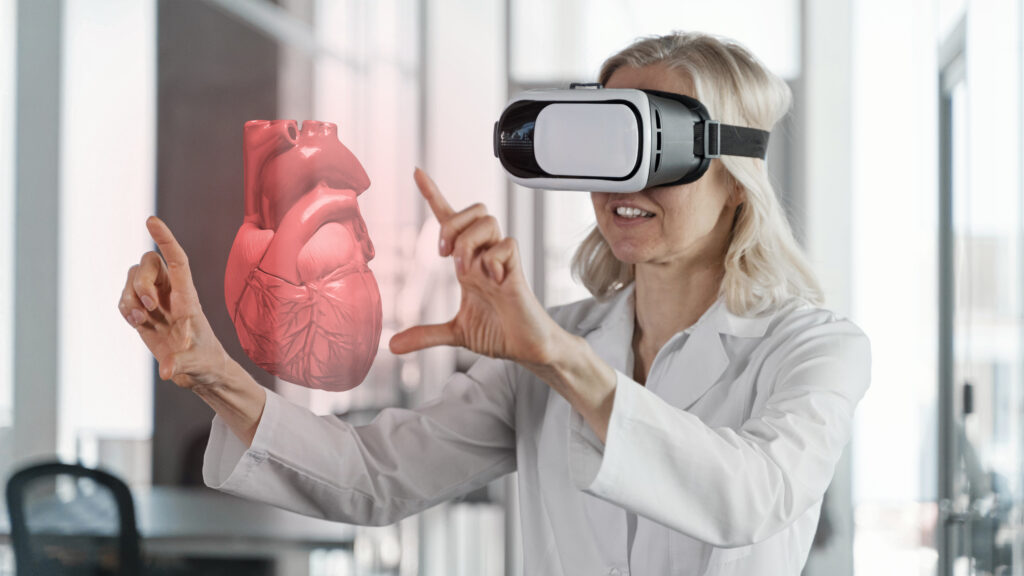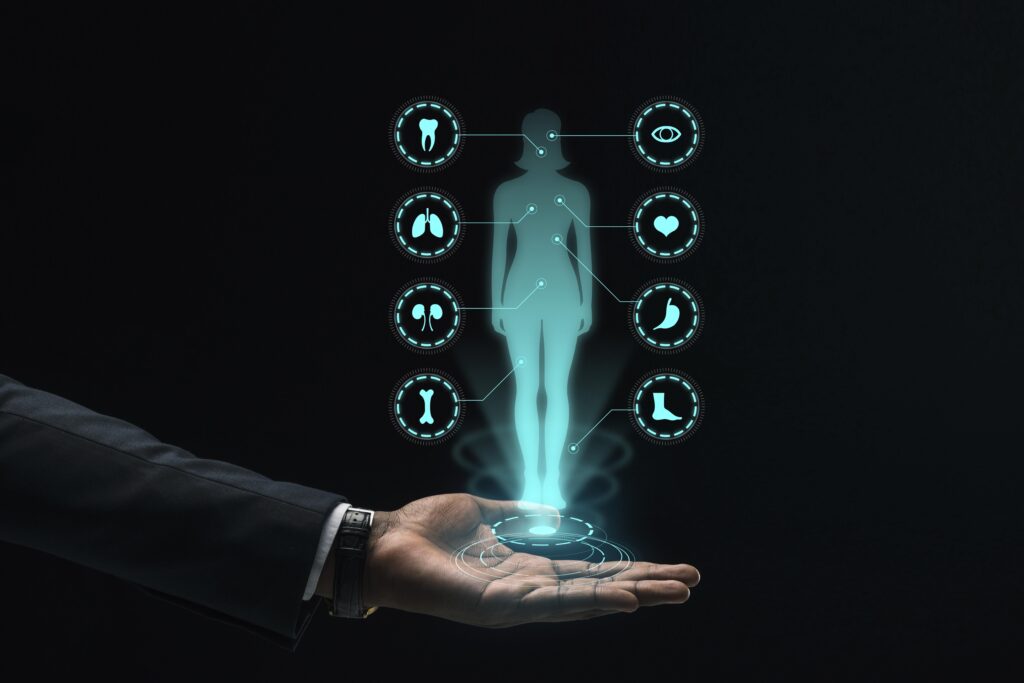With the advancement in technology and innovation, the healthcare metaverse is opening up new possibilities for patient care, diagnosis, and treatment of various diseases. The patients can experience reduced anxiety, less painful procedures, and enhanced rehabilitation.
The future of healthcare lies in the hands of the metaverse-driven approach. As technology is improving day by day, we can experience the refinement of the healthcare metaverse, leading to personalized and efficient care, improved treatment outcomes, and enhanced patient experiences.
There is certain technology that provides new directions to healthcare that is as follows:
- Robotics
- Edge Computing
- Intelligent Cloud
- Web 3.0
- Internet of Medical Devices
- Extended Reality (XR)
- Augmented Reality
- Virtual Reality
- Artificial Intelligence
Virtual Reality is one of the main components of the healthcare metaverse that includes motion sensors to create a simulated environment. Metaverse finds applications in pain management, psychological therapy, and even surgical simulations.
Benefits of Metaverse in Patient Care and Healthcare:
The main benefits of metaverse in healthcare are as follows:
- Benefits in Radiology: Metaverse visual capabilities will eventually help in Radiology imaging, unleashing new capabilities in radiology that include dynamic images for better diagnosis of disease, greater image visualization, and a clear view of reports.
- Augmented reality in Surgical Procedures: With the upcoming advanced technology like robotics, Metaverse is considered to be the best tool to perform complicated surgeries and enhance patient care. It will help to provide rapid results in real-time for better patient outcomes and surgeons can display of patient’s body vital signs, images, medical history, and other types of relevant patient data.
- Therapeutic Applications: Metaverse shows signs of new opportunities in therapeutic applications in the form of therapy where VR and AR technology enables applications such as evaluations, rehabilitation, support groups, cognitive therapy, and physical therapy. The digital therapeutics have bridged the gap between the real-world results. For example, nurses can meet patients in the Metaverse by remote monitoring them to help perform daily checkups and discussions.
- Medical Training: Metaverse is heading in the medical training as it is enhancing the learning concept such as VR can take a learner within the human body and can provide a 360-degree view of patients’ diseases, the trainers With the help of Metaverse can also get a close up view of the procedure that is enhanced with tactile haptic controls.
Challenges of the Metaverse in Healthcare and Patient Care:
There are a few challenges of the Metaverse in Patient and Healthcare that are as follows:
- High Cost of Technology: In order to make the best of the metaverse, it requires high-end infrastructure to function. From uninterrupted 5G networks to high-tech hardware the startup may be out of reach for many physicians and hospitals.
- Interoperability Issues: One of the key components is interoperability and it is considered as one of the most challenging components. With the benefits, the adoption of a metaverse in healthcare can be slow and can lead to some negative results.
- Privacy & Security Concern: Another challenging concern is the security of patients’ data. Privacy is always a major concern of the patient. Whether patient feels at ease to communicate and interact with the metaverse remains to be seen on a mass scale; but the results are always promising.
Future of Healthcare in Metaverse
With the advancement in technology in the past few years, metaverse and healthcare have gained wide attention from a number of people belonging to different industries. With the improvement in technology, in the future, the healthcare industry will be able to deliver more collaborative treatment programs.
Metaverse can be known to be an excellent environment for those professionals who love to interact with healthcare people and patients dealing with similar issues. Metaverse is known to be one of the best and health combinations of two worlds, thereby making the world and lifestyle healthy.
Conclusion
The healthcare metaverse is bringing a remarkable change in the field of medicine and healthcare. With the overall transformation in the healthcare industry, the healthcare metaverse represents a transformative integration of technology and medicine. Accepting the technology of the healthcare metaverse helps in unlocking new doors to the new era of technology-driven medicine.
FAQ
What does the future hold for the healthcare metaverse?
The future of healthcare lies in a metaverse-driven approach where the technology will combine with medicine in order to provide personalized and efficient care to the patients.
Are there any limitations to the healthcare metaverse?
Yes, there are certain limitations to the healthcare metaverse that include potential barriers, regulatory complexities, technological barriers, and high implementation costs.
How does healthcare metaverse can help in improving patient’s healthcare?
The healthcare metaverse helps to improve the health of patients by using immersive experiences, personalized rehabilitation, remote consultations, and improved surgery procedures.
Can the healthcare metaverse help in medical education?
Yes, the healthcare metaverse provides a great platform for immersive learning, stimulation-based medical education and collaborative training.



